Nespresso’s AAA Sustainable Quality Program Wins 2017 Corporate Citizenship Award
Nespresso's AAA Sustainable Quality Program, implemented by TechnoServe in East Africa, was named the "Best Economic Empowerment Program" in the 2017 Corporate Citizenship Awards.
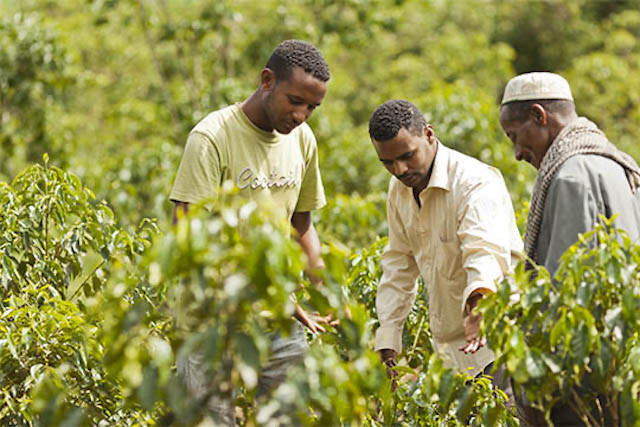
Each year, the U.S. Chamber of Commerce Foundation’s Corporate Citizenship Center recognizes the best efforts to amplify the impact of social responsibility and shared value efforts by corporations through the Corporate Citizenship Awards. In 2017, Nespresso was named “Best Economic Empowerment Program” for its AAA Sustainable Quality Program. This program – which is implemented by TechnoServe in East Africa – leverages Nespresso’s longstanding commitment to provide its customers with high-quality coffee that is sourced in an economically, environmentally, and socially sustainable way for farming communities, and is helping farmers in Ethiopia and Kenya to produce better coffee, earn higher incomes, and protect the local environment.
Of the 3 million farmers who grow coffee in East Africa, most are smallholders, and 75 percent live in poverty. While coffee is one of the world’s most popular beverages, and there is growing demand for high-quality beans, many farmers are unable to take full advantage of this economic opportunity. These farmers are often unaware of agronomic best practices, and lack sustainable markets, bargaining power, and processing equipment to improve coffee quality. As a result, their coffee yields are low and unpredictable, and they are sold at low prices that keep farmers trapped in poverty. Additionally, the production of coffee in the region often has negative environmental impacts, including the mismanagement of water resources and the emission of water pollution at processing facilities.
Turning such cycles of poverty and degradation into cycles of prosperity and sustainability requires broad and complex change all along the value chain. However, Nespresso’s award stands as evidence of the private sector’s power to drive this type of transformation when companies prioritize the sustainability of their business, and the people and resources behind their success.
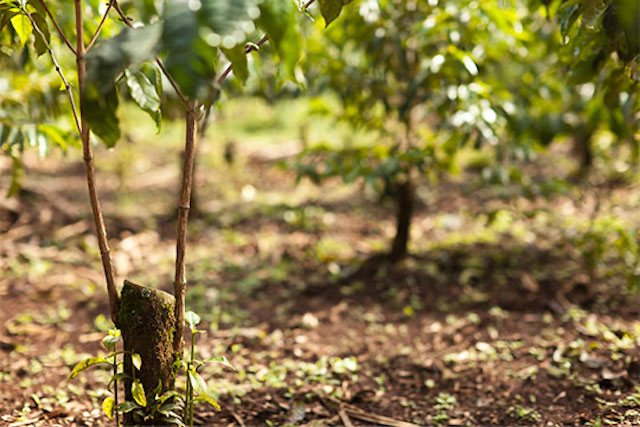
Sector-wide partnership and planning for a new coffee value chain
Understanding that such a transformation requires broad-reaching consultation and capacity building, Nespresso and TechnoServe prepared for the program’s launch in East Africa by consulting with national and subnational government officials, local financial institutions, agro-input suppliers, cooperative leaders, wet mill managers, and farmers.
In collaboration with Nespresso suppliers in East Africa, the partners conducted sensory mapping across selected coffee-producing regions to identify the areas with a cup profile that met Nespresso quality requirements. Internally, the program required coordination between Nespresso’s sustainability and program teams, as well as the quality team tasked with ensuring that the coffee capsules have a consistent and unique taste profile. Based upon these consultations, Nespresso worked with TechnoServe to define the program objectives, lay out a strategy to achieve those objectives, and place a monitoring and evaluation system to measure the progress toward those objectives.
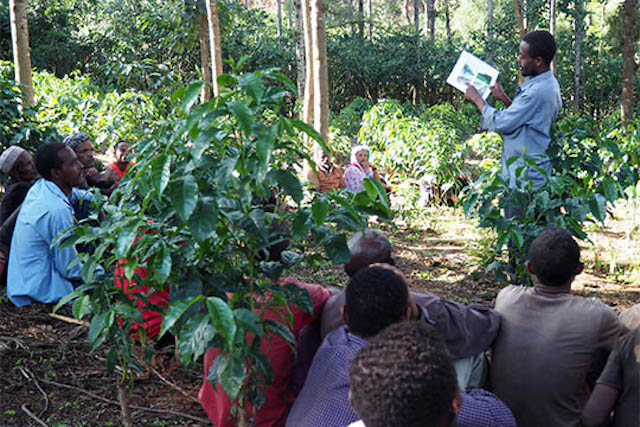
A better cup of coffee – for consumers and farmers alike
The AAA Sustainable Quality Program works both at the farm and processor levels of the value chain to improve farmer livelihoods and make coffee production more sustainable.
On the farm
In order to improve farmers’ coffee yields, quality, and incomes, the program mobilizes the AAA Academy, a two-year training program that has been delivered to 30,000 coffee farmers – 38 percent of whom are women – in their communities since 2013. The training curriculum covers a number of no-cost or low-cost techniques that cash-strapped farmers can use to sustainably increase their production and improve the quality of their crop.
Training is administered through an adult learning methodology that emphasizes hands-on instruction and features the creation of demonstration plots, where farmers can see first-hand the impact that good agricultural practices have on coffee trees. This practical approach is effective for farmers, as evidenced by a recent survey in Kenya, which found that 55 percent of participating farmers were using at least half of the good agricultural practices emphasized by the Academy even after the program – compared to 0 percent beforehand.
In addition to training, the program launched an initiative in 2016 to help farmers access seedlings to use as shade trees. The program expects to facilitate the planting of 1 million trees, improving the resiliency of the region’s coffee farms in the face of climate change. One community member told a meeting in Ethiopia, “I am a professional agronomist and have served farmers in this area for over a decade. But we were not fruitful. [The AAA Program] has greatly impacted our [district] over the course of two years. We saw a stumped coffee tree producing high yields. Recordkeeping was also new to us [agronomists], let alone to farmers, but now they’ve been trained by AAA agronomists.”
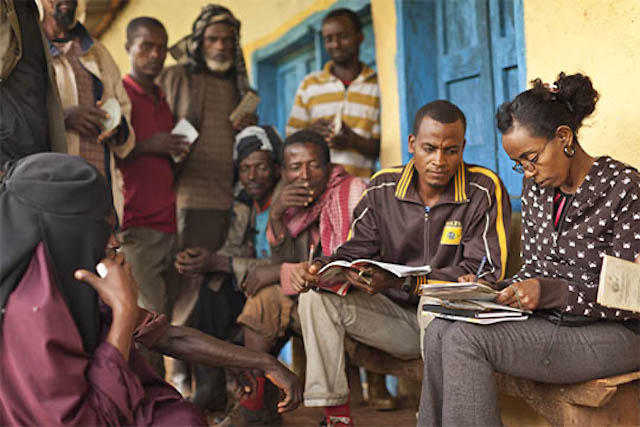
At the wet mill
The program also works with cooperative-owned wet mills to improve their operations. Wet mills aggregate and process the raw coffee produced by thousands of local farmers. When done correctly, this centralized processing yields higher-quality coffee than traditional, on-the-farm methods, and increases farmer incomes while saving them time. To date, the program has delivered personalized training to managers and workers at 146 wet mills, helping them acquire the technical skills needed to process high-quality coffee along with the business skills needed to successfully manage these small enterprises.
The program has also worked to improve the sustainability of these wet mills by teaching and tracking a core set of 26 sustainability standards, ranging from employment practices – like the elimination of child labor and adherence to minimum wage requirements – to environmental stewardship. One innovative practice promoted by the program is the use of low-tech, vetiver-grass wetlands to keep the wet mills’ wastewater from entering rivers. Participating wet mills have begun to make strides toward improved compliance with sustainability standards. After the program, 99 percent of the wet mills evaluated in Kenya, and 93 percent of those evaluated in Ethiopia, complied with at least 90 percent of the core criteria, while vetiver grass wetlands had been installed at five wet mills.
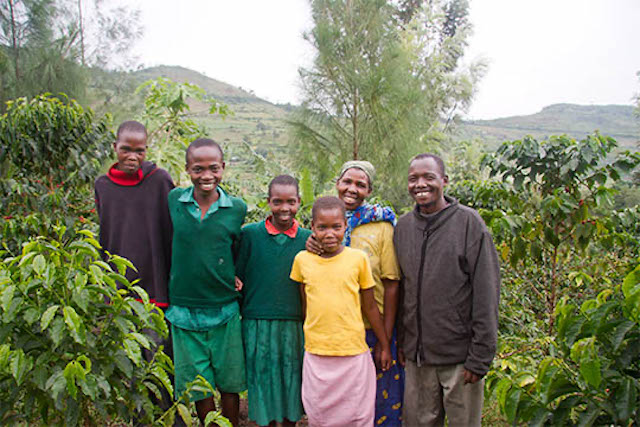
Proving the possibility of a sustainable coffee supply chain
In addition to the impressive and essential impact that the program has had for individual farmers to date, one of the most exciting implications of the program is its proof that, with the right incentives, sustainability improvements in the coffee supply chain are, in fact, achievable.
Because the adoption of sustainable farming and processing practices made economic sense – as they provide better productivity, higher prices, and/or reduced operating expenses – farmers and processors did not see them as a burden being imposed upon them, but rather as a business opportunity. This has led to high adoption rates of both good agricultural practices on the farm and core sustainability criteria at the wet mills.
A great part of this proof is the program’s demonstration that public-private partnerships can deliver change. In 2016, the World Bank and International Finance Corporation joined the project in Ethiopia, which has allowed it to scale-up in size and deepen its impact.
Read more about TechnoServe’s work with Nespresso in our Annual Report.



